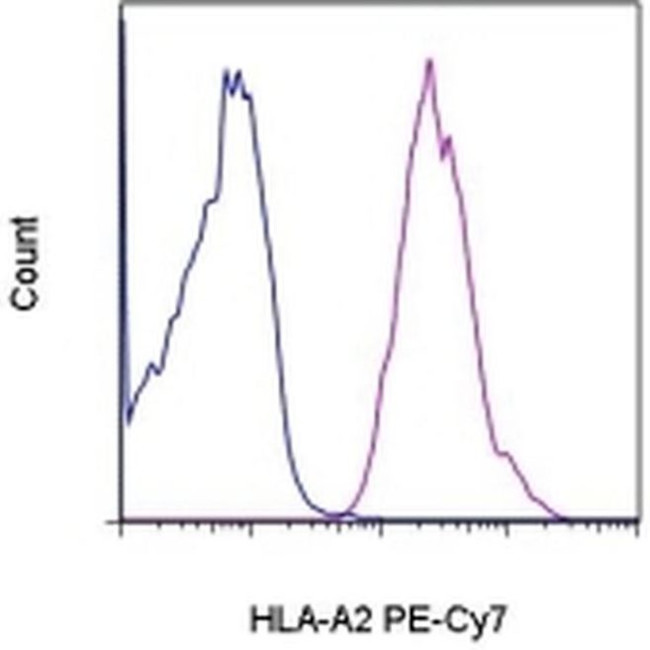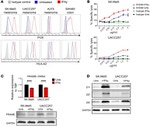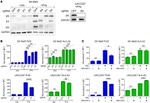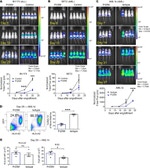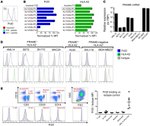Search Thermo Fisher Scientific
Invitrogen
HLA-A2 Monoclonal Antibody (BB7.2), PE-Cyanine7, eBioscience™
Product Details
25-9876-42
Species Reactivity
Published species
Host/Isotype
Recommended Isotype Control
Class
Type
Clone
Conjugate
Excitation/Emission Max
Form
Concentration
Purification
Storage buffer
Contains
Storage conditions
Shipping conditions
RRID
Product Specific Information
Description: This BB7.2 monoclonal antibody recognizes the human major histocompatibility complex (MHC) class I molecule HLA-A2, which is a member of the HLA-A family. MHC class I exists as a single alpha chain composed of three domains. This molecule associates with beta 2-microglobulin and is expressed on all nucleated cells.
The BB7.2 monoclonal antibody has been reported to exhibit blocking activity, as well as recognize HLA-A28.
Applications Reported: This BB7.2 antibody has been reported for use in flow cytometric analysis.
Applications Tested: This BB7.2 antibody has been pre-titrated and tested by flow cytometric analysis of normal human peripheral blood cells. This can be used at 5 µL (0.25 µg) per test. A test is defined as the amount (µg) of antibody that will stain a cell sample in a final volume of 100 µL. Cell number should be determined empirically but can range from 10^5 to 10^8 cells/test.
Light sensitivity: This tandem dye is sensitive photo-induced oxidation. Please protect this vial and stained samples from light.
Fixation: Samples can be stored in IC Fixation Buffer (Product # 00-8222) (100 µL cell sample + 100 µL IC Fixation Buffer) or 1-step Fix/Lyse Solution (Product # 00-5333) for up to 3 days in the dark at 4°C with minimal impact on brightness and FRET efficiency/compensation. Some generalizations regarding fluorophore performance after fixation can be made, but clone specific performance should be determined empirically.
Excitation: 488-561 nm; Emission: 775 nm; Laser: Blue Laser, Green Laser, Yellow-Green Laser.
Filtration: 0.2 µm post-manufacturing filtered.
Target Information
HLA-A belongs to the HLA class I heavy chain paralogues. This class I molecule is a heterodimer consisting of a heavy chain and a light chain (beta-2 microglobulin). The heavy chain is anchored in the membrane. Class I molecules play a central role in the immune system by presenting peptides derived from the endoplasmic reticulum lumen. They are expressed in nearly all cells. The heavy chain is approximately 45 kDa and its gene contains 8 exons. Exon 1 encodes the leader peptide, exons 2 and 3 encode the alpha1 and alpha2 domains, which both bind the peptide, exon 4 encodes the alpha3 domain, exon 5 encodes the transmembrane region, and exons 6 and 7 encode the cytoplasmic tail. Polymorphisms within exon 2 and exon 3 are responsible for the peptide binding specificity of each class one molecule. Typing for these polymorphisms is routinely done for bone marrow and kidney transplantation. Hundreds of HLA-A alleles have been described.
HLA and MHC antibodies play a significant role in Immunopeptidomics, facilitating the identification and characterization of neoantigens through high-performance liquid chromatography coupled to tandem Mass Spectrometry.
For Research Use Only. Not for use in diagnostic procedures. Not for resale without express authorization.
How to use the Panel Builder
Watch the video to learn how to use the Invitrogen Flow Cytometry Panel Builder to build your next flow cytometry panel in 5 easy steps.
Bioinformatics
Protein Aliases: A29 protein; antigen presenting molecule; DAQB-90C11.16; FLJ26655; HLA A; HLA class I antigen; HLA class I histocompatibility antigen, A alpha chain; HLA class I histocompatibility antigen, A-30 alpha chain; HLA class I histocompatibility antigen, A-33 alpha chain; HLA class I histocompatibility antigen, A-74 alpha chain; HLA locus; HLA-A; HLA-A locus alpha 2 domain; HLA-A null; HLA-Aw33.1; Human leukocyte antigen A; leucocyte antigen A; leukocyte antigen class I-A; MCH class I antigen; MHC 1; MHC class 1 antigen; MHC class I anti; MHC Class I antigen; MHC class I antigen A*30; MHC class I antigen A*33; MHC class I antigen A*74; MHC class I antigen heavy chain; MHC class I antigen HLA-A heavy chain; MHC class I antigen HLA-A33; MHC class I antigen null protein; MHC class I antigene; MHC class II antigen; MHC classI antigen; MHC1; truncated MHC class I antigen
Gene Aliases: Aw-33; Aw-74; HLA-A; HLA-A11; HLA-A33; HLA-DQB1; HLA-DRB1; HLAA
UniProt ID: (Human) Q9TQM6
Entrez Gene ID: (Human) 3105

Performance Guarantee
If an Invitrogen™ antibody doesn't perform as described on our website or datasheet,we'll replace the product at no cost to you, or provide you with a credit for a future purchase.*
Learn more
We're here to help
Get expert recommendations for common problems or connect directly with an on staff expert for technical assistance related to applications, equipment and general product use.
Contact tech support
